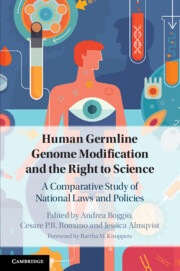 Human Germline Genome Modification and the Right to Science
Human Germline Genome Modification and the Right to Science Book contents
- Human Germline Genome Modification and the Right to Science
- Human Germline Genome Modification and the Right to Science
- Copyright page
- Dedication
- Contents
- Figures
- Tables
- Notes on Contributors
- Foreword
- Preface
- Acknowledgments
- Abbreviations
- 1 Introduction
- 2 The Governance of Human (Germline) Genome Modification at the International and Transnational Levels
- The Regulation of Genome Modification at the National Level
- Part I North America
- Part II Europe
- 6 The Regulation of Human Germline Genome Modification in Europe
- 7 The Regulation of Human Germline Genome Modification in the United Kingdom
- 8 The Regulation of Human Germline Genome Modification in Germany
- 9 The Regulation of Human Germline Genome Modification in Belgium
- 10 The Regulation of Human Germline Genome Modification in Sweden
- 11 The Regulation of Human Germline Genome Modification in the Netherlands
- 12 The Regulation of Human Germline Genome Modification in Italy
- 13 The Regulation of Human Germline Genome Modification in Spain
- 14 The Regulation of Human Germline Genome Modification in France
- 15 The Regulation of Human Germline Genome Modification in Switzerland
- Part III Asia
- Part IV Other OECD Countries
- Part V Conclusions
- Index
12 - The Regulation of Human Germline Genome Modification in Italy
from Part II - Europe
Published online by Cambridge University Press: 15 November 2019
- Human Germline Genome Modification and the Right to Science
- Human Germline Genome Modification and the Right to Science
- Copyright page
- Dedication
- Contents
- Figures
- Tables
- Notes on Contributors
- Foreword
- Preface
- Acknowledgments
- Abbreviations
- 1 Introduction
- 2 The Governance of Human (Germline) Genome Modification at the International and Transnational Levels
- The Regulation of Genome Modification at the National Level
- Part I North America
- Part II Europe
- 6 The Regulation of Human Germline Genome Modification in Europe
- 7 The Regulation of Human Germline Genome Modification in the United Kingdom
- 8 The Regulation of Human Germline Genome Modification in Germany
- 9 The Regulation of Human Germline Genome Modification in Belgium
- 10 The Regulation of Human Germline Genome Modification in Sweden
- 11 The Regulation of Human Germline Genome Modification in the Netherlands
- 12 The Regulation of Human Germline Genome Modification in Italy
- 13 The Regulation of Human Germline Genome Modification in Spain
- 14 The Regulation of Human Germline Genome Modification in France
- 15 The Regulation of Human Germline Genome Modification in Switzerland
- Part III Asia
- Part IV Other OECD Countries
- Part V Conclusions
- Index
Summary
For historical, social, political and religious reasons, Italy has traditionally approached life sciences, especially those involving humans, with great caution. The main law touching on human germline genome modification, called Law 40/2004 (‘Rules on Medically Assisted Reproduction’) bans most ‘experimentation’ on human embryos. In addition, EU Regulation 536/2014 contains a ban on clinical research using germline modification technologies. Nevertheless, Article 13 of Law 40/2004 leaves the door open to clinical applications of germline modification technologies. However, only the improvement of basic research on gametes would permit in the future to decide if, and possibly identify which, clinical applications are scientifically feasible and ethically acceptable. Recent developments and new possibilities in the field of human germline genome modification call for regulations that, while setting limits to contain possible abuses, do not wholly frustrate scientific and technological progress. Moreover, human germline genome modification technologies, which have enormous therapeutic potential, can further certain values enjoying a constitutional status under the Italian legal system, such as the promotion of scientific progress and the protection of health.
Keywords
- Type
- Chapter
- Information
- Human Germline Genome Modification and the Right to ScienceA Comparative Study of National Laws and Policies, pp. 335 - 357Publisher: Cambridge University PressPrint publication year: 2020


